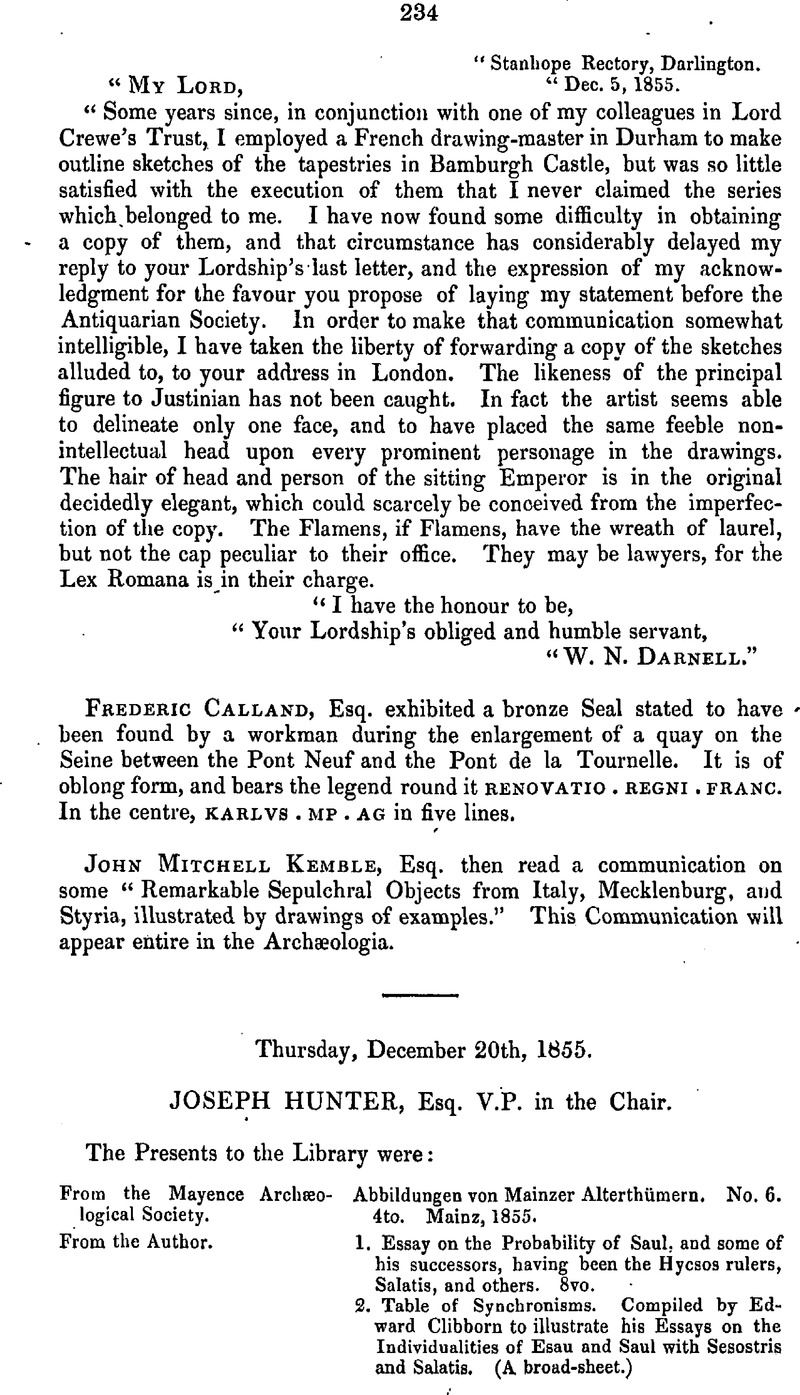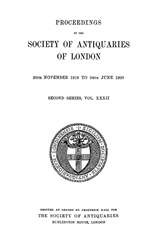No CrossRef data available.
Article contents
Thursday, December 20th, 1855
Published online by Cambridge University Press: 10 May 2010
Abstract

- Type
- Proceedings
- Information
- Copyright
- Copyright © The Society of Antiquaries of London 1856
References
page 236 note * “The lower part of the village,” says Gilbert White, “next the Grange, in which is a pond and a stream, is well-known by the name of Gracious Street, an appellation not at all understood. There is a lake in Surrey, near Chobham, called also Gracious Pond,; and another, if we mistake not, near Hedleigh, in the county of Hants. This strange denomination we do not at all comprehend, and conclude that it may be a corruption from some Saxon word, itself perhaps forgotten.” I found Gracious Pond to be an extensive hollow between lofty hills, now a peat-bog, but formerly a fine sheet of water covering some thirty or forty acres, and called Gracious Pond, or Godley Lake, it being in the hundred of Godley. This lake was originally formed by a Prior of Chertsey Abbey; who, taking advantage of the situation as the reservoir of the natural drainage of the surrounding hills, and of a stream from the bog, not only made a preserve for fish and wild fowl, but added a beautiful feature to this otherwise barren spot, by the formation of a fine lake. As to the designation of “Gracious,” which seems to have puzzled Gilbert White, it was in all probability corrupted from Gracechurch,. The “Gracious Street” at Selborne led to the Priory, and Gracious Pond at Chobham belonged to the celebrated Abbey, or Grace-church of Chertsey, founded in the time of King Egbert. The original designation is still preserved in Gracechurch Street, London, which is also commonly corrupted into “Gracious Street.” The application of the term “Grace” to an abbey is thus alluded to by Stow, p. 792. “North of the Tower, lyeth East Smithfield, Hogs Streete, and Tower Hill, and east from them both was the New Abbey, called Grace,, founded by Edward the Third.” Mr. Mumford informed me that a cell or chapel belonging to Chertsey Abbey formerly existed on the banks of the Godley Lake. In support of this statement, I find: — “In Godelie Hund. Ipsa Abbatia tenet Cebeham—ibi Ecclesia et alia capella,” quoted from the Domesday Book in Ellis's Dugdale, vol. i. p. 430. And in reference to the grant of Chobham to the Abbey of Chertsey the following occurs; viz., “In (Abbot) Wluvolde's time King Edward the Confessor appears to have bestowed upon the Monastery (of Chertsey) the hundred of Goddeley,” ibid. vol. i. p. 422. This appears from the Saxon charter at p. 429, No. VI.; and No. VII. is another charter of the same king, in which Chabbeham is specially mentioned as a grant in perpetuity to the same abbey. The Vicarage of Chobham was endowed by the monastery of Chertsey, and confirmed by an instrument, entitled “Ordinaria Dotatio Vicarise de Chabeham,” in the Chartulary of the Abbey in the Queen's Remembrancer's Office, Exchequer, dated 1334, and further confirmed with an augmentation of the Endowment, 1427, by an additional grant of 20s,. per annum, to be paid quarterly by the monastery. At the period of the Reformation, Chobham, with the other manors belonging to the abbey, fell to the Crown, and was disposed of by grants of long leases, to the subsequent occupiers. From the period of the dissolution of monastic establishments until within a few years, the lake above referred to continued to be a great resort of the various species of wild fowl, and thus proved a considerable benefit to the neighbourhood. At a comparatively recent period the “pent-stock” required some repair, which the owner of the soil not only declined to carry out, but ordered it to be pulled up, and suffered the water to escape by the natural channel.
page 238 note * The passages from Caesar's Commentaries are quoted from the old translation by Col. Martin Bladen, edition of 1726.




